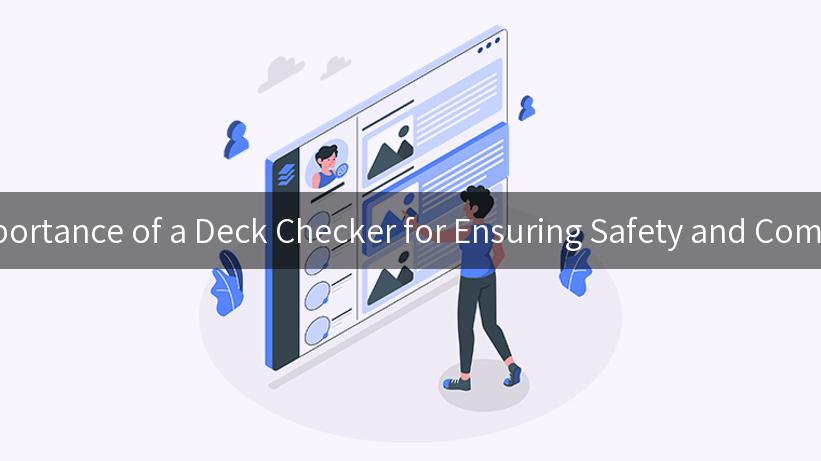
In today’s fast-paced environment, regulatory compliance and safety are paramount across various industries. Companies seek reliable solutions to ensure that both their physical assets and digital operations conform to required standards. Among the various tools available to help organizations maintain safety and compliance, the deck checker stands out. This article delves into the importance of a deck checker and explores how it integrates with tools like APIPark, Kong, and the Invocation Relationship Topology to enhance operational safety.
What is a Deck Checker?
A deck checker is a quality control tool that examines the condition of equipment, personnel protocols, and safety compliance within various operational areas, particularly in industries like construction, engineering, and IT services. This tool performs multiple checks to ensure the adherence of standards set forth by local regulations, industry best practices, and internal company policies.
Benefits of a Deck Checker:
– Risk Mitigation: By regularly assessing compliance, organizations can drastically reduce the risk of accidents.
– Regulatory Adherence: Ensures that operations meet the necessary legal requirements, thereby avoiding fines or legal complications.
– Operational Efficiency: Streamlines processes by identifying areas that require improvement, leading to more effective operations.
Why is Compliance Important?
Compliance is not merely a bureaucratic function; it is a vital aspect of maintaining public trust and business integrity. Non-compliance can lead to severe consequences, including legal ramifications, financial penalties, and damage to reputation. Furthermore, a company’s commitment to safety and compliance translates into increased trust and loyalty from customers.
The Role of Technology in Enhancing Compliance
With the advent of modern technology, companies can leverage various tools and platforms to ensure compliance. Among these, APIPark emerges as a significant player in the digital landscape. APIPark enables organizations to manage their APIs effectively and promotes safety through controlled access and monitoring.
Integrating APIPark with Deck Checkers
APIPark is a comprehensive API asset management platform that allows businesses to maintain a centralized system for their APIs. By employing a deck checker in conjunction with APIPark, organizations can achieve a robust compliance framework:
-
API Resource Approval Process: APIPark ensures that all API calls are logged and justified. The deck checker can be programmed to verify the legitimacy of these API calls regularly.
-
Detailed Invocation Relationship Topology: Understanding the relationships between different APIs and their invocation patterns is vital for compliance. The topology provided by APIPark highlights how data flows through different APIs, which can be audited by the deck checker.
-
Statistical Reporting and Monitoring: Deck checkers can analyze historical call data provided by APIPark to identify unusual patterns that may signify compliance failures.
| Feature |
APIPark |
Deck Checker |
| API Management |
Centralized control |
Compliance verification |
| Approval Process |
Yes |
Yes |
| Invocation Topology |
Detailed visualization |
Risk identification |
| Statistical Reporting |
Yes |
Compliance audits |
Utilizing Kong to Enhance API Security
Kong is an open-source API gateway that provides comprehensive security features, which, when combined with deck checkers, creates a formidable defense against unsafe practices in API management. Kong’s capabilities include:
- Authentication and Authorization: Ensuring that only verified users can access sensitive APIs.
- Traffic Control: Implementing rate-limiting and request validation.
By pairing Kong’s security features with a deck checker, organizations can monitor API usage against safety compliance metrics. This synergy ensures that processes are being followed consistently and eliminates potential vulnerabilities.
The Invocation Relationship Topology Explained
The Invocation Relationship Topology refers to the structural view of how various APIs interact with each other within a given ecosystem. This understanding is crucial for compliance checks as it lays out the pathways data takes, helping identify potential risks along the flow.
Building a Robust Invocation Relationship Topology
- Mapping APIs: Clearly diagram all APIs and their interactions, creating a visual representation.
- Identifying Key Dependencies: Recognize which APIs are mission-critical and prioritize their compliance checks.
- Regular Audits: Schedule systematic audits to analyze whether the invocation paths adhere to compliance protocols and quality standards.
# Sample API Call using Kong
curl --location 'http://example.com/api' \
--header 'Authorization: Bearer your_token_here' \
--header 'Content-Type: application/json' \
--data '{
"request": {
"data": "This is a test payload"
}
}'
In this example, replace example.com, your_token_here, and the JSON payload with the relevant service details. By recording API calls using Kong, the information can later assist the deck checker in verifying compliance.
The Future of Deck Checkers in API Management
As organizations move towards more integrated and automated systems, the role of deck checkers is expected to expand significantly within API management frameworks. With increasing reliance on API calls and integrations, having a reliable deck checker becomes even more essential.
- AI and Machine Learning: Future deck checkers will likely incorporate AI to predict compliance issues before they occur by analyzing patterns in data traffic.
- Real-time Monitoring: Enhanced capabilities for real-time monitoring will ensure organizations remain compliant continuously, rather than relying on periodic checks.
APIPark is a high-performance AI gateway that allows you to securely access the most comprehensive LLM APIs globally on the APIPark platform, including OpenAI, Anthropic, Mistral, Llama2, Google Gemini, and more.Try APIPark now! 👇👇👇
Conclusion
The importance of deck checkers in ensuring safety and compliance cannot be overstated. In conjunction with powerful tools like APIPark and Kong, organizations can create comprehensive oversight mechanisms that greatly enhance their operational integrity. By actively monitoring their invocation relationship topology and managing their API landscape efficiently, businesses can not only meet but exceed compliance standards, ensuring safer workplaces and building lasting trust with stakeholders.
As we move into a more interconnected digital age, the synergy of manual checks through deck checkers and smart technology adoption will be crucial in addressing the evolving demands for safety and compliance across industries.